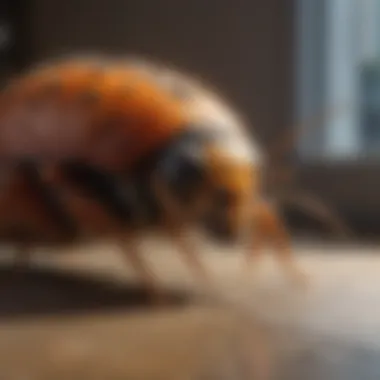Expert Strategies for Pest Control: Contacting Exterminators for Effective Solutions


Preventive Pest Control Strategies
House Exterior Protection
- When it comes to preventing pests from intruding your home, ensuring the exterior is well-protected is crucial. Sealing cracks in walls, windows, and doors is an effective way to bar entry for pests seeking shelter. Clearing debris in your yard not only enhances its appearance but also eliminates potential hiding spots for pests. Additionally, implementing measures to prevent pests from entering, such as installing screens on windows and doors, adds an extra layer of defense against unwelcome critters.
Yard Maintenance
- Maintaining your yard plays a significant role in pest control. Essential yard care routines like regular mowing, trimming bushes, and removing standing water help deter pests from making your yard their home. Employing methods such as planting pest-repelling plants or using natural pest control sprays can further contribute to keeping your yard pest-free.
Indoor Cleanliness
- A clean indoor environment is an excellent deterrent for pests. Expert cleaning tips and techniques involve thorough and regular cleaning of floors, surfaces, and storage areas to minimize potential hiding places for pests. Keeping food tightly sealed and immediately fixing any plumbing leaks also contribute to maintaining a pest-resistant indoor space.
Garbage Disposal
- Proper garbage disposal is key in pest prevention. Efficient waste disposal methods include using sealed bins, ensuring trash is taken out regularly, and keeping outdoor bins away from the house. The importance of proper garbage disposal cannot be overstated, as accumulated garbage invites pests like rodents and insects into your home.
Other Pest Prevention Strategies
- In addition to the aforementioned strategies, there are innovative ways to safeguard your home from pests. Implementing measures like installing door sweeps, repairing window screens, and sealing cracks in the foundation are effective in fortifying your home against pest invasions.
Introduction
Pest control is a crucial aspect of maintaining a safe and healthy living environment. In this article, we explore the essential strategies for effectively managing pest infestations by enlisting the expertise of exterminators. By understanding the key considerations and processes involved in pest control, individuals can safeguard their homes from potential health hazards and structural damage.
The Significance of Pest Control
Effective pest control is essential for several reasons. Firstly, pests such as rodents, insects, and termites can pose serious health risks to occupants of a property. Diseases, allergies, and bites are common problems associated with pest infestations. Additionally, pests can cause significant damage to structures, furniture, and personal belongings, leading to costly repairs and replacements. By implementing robust pest control measures, homeowners can protect their families and investments from these detrimental effects.
Role of Exterminators
Exterminators play a pivotal role in managing pest outbreaks efficiently. Their expertise in identifying pest species, assessing infestation levels, and selecting appropriate treatment methods is indispensable in eradicating pests effectively. By entrusting the job to experienced exterminators, individuals can benefit from tailored solutions that address specific pest issues in a targeted manner, ensuring long-term relief from infestations.


Purpose of the Article
The primary objective of this article is to empower readers with the knowledge and tools needed to make informed decisions when dealing with pest control issues. By elucidating the process of selecting exterminators, understanding different pest control methods, and implementing preventive measures, readers will gain valuable insights into creating a pest-free environment. Through practical guidance and expert advice, this article aims to equip individuals with the means to tackle pest infestations proactively and effectively.
Factors to Consider Before Dialing Exterminators
In the realm of pest control, the decision to enlist the services of professional exterminators is crucial. Before reaching out to these experts, it is imperative to evaluate various factors that can significantly impact the effectiveness of pest eradication processes and the overall outcome. These considerations play a pivotal role in laying the groundwork for a successful pest control operation, ensuring that the chosen exterminator can address the infestation thoroughly and efficiently.
Type of Pest Infestation
Identifying the Pest Species
Identifying the specific pest species infesting your premises is a fundamental step in the pest control process. Different pests require distinct treatment methods, making accurate identification essential. By pinpointing the exact pest species, exterminators can tailor their approach to combat the infestation effectively. This not only increases the likelihood of successful eradication but also minimizes the risk of recurring issues. Furthermore, understanding the pest species enables exterminators to employ targeted strategies that are specifically designed to combat the identified pests, enhancing the overall efficiency of the treatment.
Level of Infestation
The level of infestation is another critical aspect to consider before dialing exterminators. Assessing the extent of the infestation allows exterminators to determine the severity of the problem and devise appropriate solutions. Whether the infestation is in its early stages or has reached a critical point, this information guides exterminators in selecting the most suitable extermination methods and developing customized treatment plans. Understanding the level of infestation not only facilitates better decision-making but also helps in setting realistic expectations regarding the time and resources required to eliminate the pests effectively.
Property Assessment
Size of Property
The size of the property plays a significant role in pest control considerations as it directly influences the scale of the infestation and the approach taken by exterminators. Larger properties may require more extensive treatment and monitoring to ensure thorough pest eradication. Additionally, the layout of the property can impact the accessibility of pests and the effectiveness of treatment methods. Considering the size of the property enables exterminators to plan adequately and allocate resources efficiently, enhancing the overall success of the pest control operation.
Environmental Factors
Environmental factors encompass various aspects such as climate, landscaping, and neighboring properties that can influence pest infestations. Understanding these factors is essential in developing sustainable pest control solutions that address the root causes of infestations. By evaluating the environmental conditions, exterminators can implement preventive measures that deter future pest incursions and create an inhospitable environment for pests. This proactive approach not only mitigates immediate pest issues but also fosters long-term pest management strategies.
Budget Constraints
Budget constraints are an inherent consideration in any pest control endeavor, impacting the scope of services that can be availed and the overall quality of treatment. Establishing a clear budget framework allows homeowners to set realistic expectations and explore treatment options that align with their financial capabilities. Balancing cost considerations with the need for effective pest control is vital in ensuring that the chosen exterminator can deliver satisfactory results without exceeding budgetary limits. Open communication regarding budget constraints with exterminators enables homeowners to explore cost-effective solutions and make informed decisions that prioritize both financial prudence and pest eradication outcomes.
Steps to Follow When Initiating Contact


In the realm of pest control, the initial step of reaching out to exterminators holds a pivotal role in the effectiveness of pest management strategies. When initiating contact with exterminators, it is crucial to conduct thorough research to ensure the selection of a reputable and competent service provider. This process involves several essential elements that can significantly impact the outcome of pest control efforts.
First and foremost, researching exterminator services helps in understanding the various options available and allows for a comparison of their expertise, pricing, and customer reviews. By delving into the background of different exterminators, homeowners can make informed decisions based on the quality of service provided by each. This step sets the foundation for a successful pest control plan by ensuring that the selected exterminator aligns with the specific requirements of the infestation.
Moreover, the importance of researching exterminator services lies in the ability to assess their track record and reputation. Online reviews play a vital role in this process, offering insights into the experiences of previous clients and the exterminators' overall performance. By analyzing these reviews, homeowners can gauge the reliability and efficacy of the exterminator, guiding them towards an informed choice.
Researching Exterminator Services
Online Reviews
Online reviews serve as a valuable tool in evaluating the quality of exterminator services and gaining an understanding of customer satisfaction levels. These reviews provide firsthand accounts of customers' experiences, shedding light on the effectiveness of pest control treatments and the professionalism of the exterminators. By considering online reviews, homeowners can make informed decisions based on the feedback and recommendations of others who have availed of similar services.
The key characteristic of online reviews lies in their transparency and authenticity. Unlike marketing materials or promotional content, online reviews offer genuine perspectives from individuals who have experienced the exterminator's services firsthand. This credibility enhances the reliability of the information provided, helping homeowners make well-informed choices when selecting an exterminator.
One of the standout advantages of online reviews is their widespread availability and accessibility. With online platforms hosting a plethora of reviews on various exterminator services, homeowners can easily compare different providers and their offerings. This accessibility streamlines the decision-making process, allowing homeowners to navigate through the options efficiently and choose a reputable exterminator that meets their specific requirements.
Considering the unique feature of online reviews in the context of this article, it becomes evident that they play a crucial role in empowering homeowners with the information needed to tackle pest infestations effectively. By leveraging online reviews, readers can gain valuable insights into the reliability, professionalism, and performance of different exterminators, facilitating an informed decision-making process.
Referrals
Referrals hold a significant weight in the selection of exterminator services, offering a personal recommendation from trusted sources. When seeking referrals for pest control, homeowners can benefit from the firsthand experiences of friends, family, or neighbors who have previously dealt with similar pest issues. These referrals carry a level of credibility and trust that can influence the decision-making process.
The key characteristic of referrals lies in the personal connection between the referrer and the homeowner. Unlike anonymous online reviews, referrals come from individuals with whom the homeowner shares a relationship, enhancing the reliability of the recommendation. This personal touch instills confidence in the suggested exterminator, as it is based on a direct interaction and established trust.
A notable advantage of referrals is the sense of assurance they provide to homeowners. By receiving a recommendation from someone within their social circle or community, homeowners can navigate the vast array of exterminator services with more confidence. This assurance stems from the trust placed in the referrer's judgment, creating a seamless transition from the research phase to the selection of an exterminator.
When considering the unique feature of referrals within the context of this article, it becomes evident that they contribute to a personalized and tailored approach to selecting exterminator services. By leveraging referrals, readers can tap into the experiences and opinions of others they trust, guiding them towards a reliable and effective pest control solution tailored to their specific needs.
Assessing Exterminator Qualifications
In the realm of pest control, the cornerstone of ensuring effective pest management lies in assessing exterminator qualifications. This pivotal step is a fundamental aspect explored in this insightful article on dialing exterminators for pest control. By meticulously scrutinizing exterminator qualifications, individuals can make informed decisions that will have a direct impact on the success of their pest control endeavors.
Certifications and Licensing


A critical component of assessing exterminator qualifications revolves around certifications and licensing. These serve as tangible proof of an exterminator's competency and adherence to industry standards. Possessing the necessary certifications denotes that the exterminator has undergone requisite training and is well-versed in the latest pest control techniques. Licensing further ensures that the exterminator meets legal requirements, giving clients peace of mind knowing that they are dealing with a legitimate and qualified professional. When evaluating exterminators, individuals should prioritize those who hold valid certifications and licenses, as these credentials are indicative of a higher level of expertise and credibility.
Expertise in Pest Control
Beyond certifications and licensing, expertise in pest control is a paramount factor to consider when assessing exterminator qualifications. An experienced exterminator brings a wealth of knowledge and practical skills to the table, honed through years of tackling diverse pest infestations. Their proficiency in identifying pests, understanding their behavior, and selecting appropriate control methods can significantly enhance the effectiveness of pest management strategies. By choosing an exterminator with a proven track record of successfully resolving pest issues, individuals can garner reassurance in the competency and mastery demonstrated by the professional.
Warranty and Guarantee Policies
Additionally, the warranty and guarantee policies offered by exterminators play a substantial role in the assessment of their qualifications. These policies serve as assurances to clients, outlining the level of commitment and confidence the exterminator has in their services. A robust warranty ensures that if pest issues persist after treatment, the exterminator will return to address them at no extra cost. Likewise, guarantee policies provide a safety net for clients, promising effective results and optimal pest control outcomes. By thoroughly reviewing the warranty and guarantee policies of exterminators, individuals can safeguard their interests and investments, securing reliable and satisfactory pest control solutions.
Understanding Pest Control Methods
In the realm of pest control, understanding pest control methods holds paramount importance in effectively managing infestations. This section sheds light on the diverse strategies and techniques utilized to combat pests, ensuring a pest-free environment for households. By comprehending the intricacies of various pest control methods, individuals can make informed decisions when selecting exterminators for their pest issues. Understanding Pest Control Methods provides key insights into the efficacy, safety, and sustainability of pest management approaches, guiding readers towards optimal solutions for their specific pest problems.
Chemical Treatments
Chemical treatments are a popular but contentious method in pest control. These treatments involve the use of chemical substances to eliminate pests swiftly. While chemical treatments can deliver quick results, they come with potential risks to human health and the environment. Hence, it is crucial to entrust such procedures to qualified professionals who adhere to safety protocols and regulations. Chemical treatments, when used judiciously and in conjunction with preventive measures, can be effective in eradicating pests while minimizing harm.
Integrated Pest Management (IPM)
Integrated Pest Management (IPM) represents a holistic approach to pest control that integrates multiple strategies for sustainable solutions. IPM emphasizes prevention, monitoring, and control through a combination of biological, mechanical, and chemical tools. By focusing on long-term pest management rather than just short-term elimination, IPM promotes environmental responsibility and minimizes the reliance on harmful chemicals. Implementing IPM strategies requires a comprehensive understanding of pest behavior and ecosystem dynamics, making it a sophisticated yet effective methodology for pest control.
Non-Chemical Approaches
Non-chemical approaches offer eco-friendly alternatives for pest control, catering to those wary of chemical interventions. These methods include physical barriers, traps, biological controls, and cultural practices to deter and manage pests without resorting to chemicals. Non-chemical approaches prioritize natural pest control mechanisms, promoting a harmonious balance in the ecosystem. While non-chemical approaches may require more time and effort compared to chemical treatments, they offer sustainable solutions that pose minimal risks to human health and the environment, aligning with a eco-conscious approach to pest management.
Ensuring a Pest-Free Environment
In the realm of effective pest control, ensuring a pest-free environment stands as a pinnacle of success. This crucial aspect encapsulates the ultimate goal of extermination services - the complete eradication of pests and the prevention of their return. By delving into the nuances of pest management beyond mere extermination, a holistic approach is adopted to safeguard homes from future infestations. While exterminators play a vital role in eliminating existing pests, it is the measures taken to ensure a pest-free environment that truly solidify the protection of the premises.
Post-Treatment Preventive Measures
Maintaining Hygiene:
Within the domain of post-treatment preventive measures, the significance of maintaining hygiene cannot be overstated. This facet encompasses a meticulous adherence to cleanliness protocols post-extermination, aiming to eliminate potential attractants and breeding grounds for pests. By upholding stringent hygiene practices such as regular cleaning, proper waste disposal, and maintenance of sanitation standards, homeowners fortify their defenses against future pest incursions. The key characteristic of maintaining hygiene lies in its proactive nature - by removing enticements for pests, the likelihood of re-infestation is significantly reduced. This proactive stance complements extermination efforts and prolongs the effectiveness of the treatment. Additionally, maintaining hygiene not only deters pests but also ensures a healthy living environment for residents. The unique feature of maintaining hygiene is its role in creating an inhospitable climate for pests to thrive, thereby serving as a sustainable strategy for long-term pest control.
Sealing Entry Points:
Another vital component of ensuring a pest-free environment is the meticulous process of sealing entry points. By identifying and fortifying potential entryways utilized by pests, homeowners establish a formidable barrier against unauthorized intrusions. This proactive measure serves as a preventive strategy to impede the ingress of pests into the property, even after the completion of extermination treatments. The key characteristic of sealing entry points lies in its ability to address vulnerabilities in the property's structure that could serve as access points for pests. By effectively sealing gaps, cracks, and openings, homeowners eliminate common entry routes favored by pests, thereby reducing the likelihood of re-infestation. The unique feature of sealing entry points is its proactive nature, which acts as a preemptive defense mechanism against potential pest infiltrations. This method not only reinforces the structural integrity of the property but also acts as a long-term solution for pest exclusion.



